A Report on the Challenges of Ocean Plastic Pollution in Britain
VerifiedAdded on 2020/10/23
|6
|1031
|76
Report
AI Summary
This report delves into the critical issue of ocean plastic pollution in Britain, highlighting the significant challenges it poses. The introduction outlines the dire consequences of plastic waste, including its impact on marine life and the ecosystem. The report identifies the primary sources of plastic pollution, such as waste dumping and the breakdown of plastics into microplastics, which attract toxins and disrupt the food chain. It also discusses the current measures taken by the UK government and retailers to address the problem, including plastic bans and the promotion of reusable alternatives. The report emphasizes the need for collective action, recommending measures like using reusable bottles and bags, and avoiding excessive food packaging. It also suggests collaboration with international organizations like the United Nations Environment Programme to mitigate plastic waste and promote awareness about the issue.
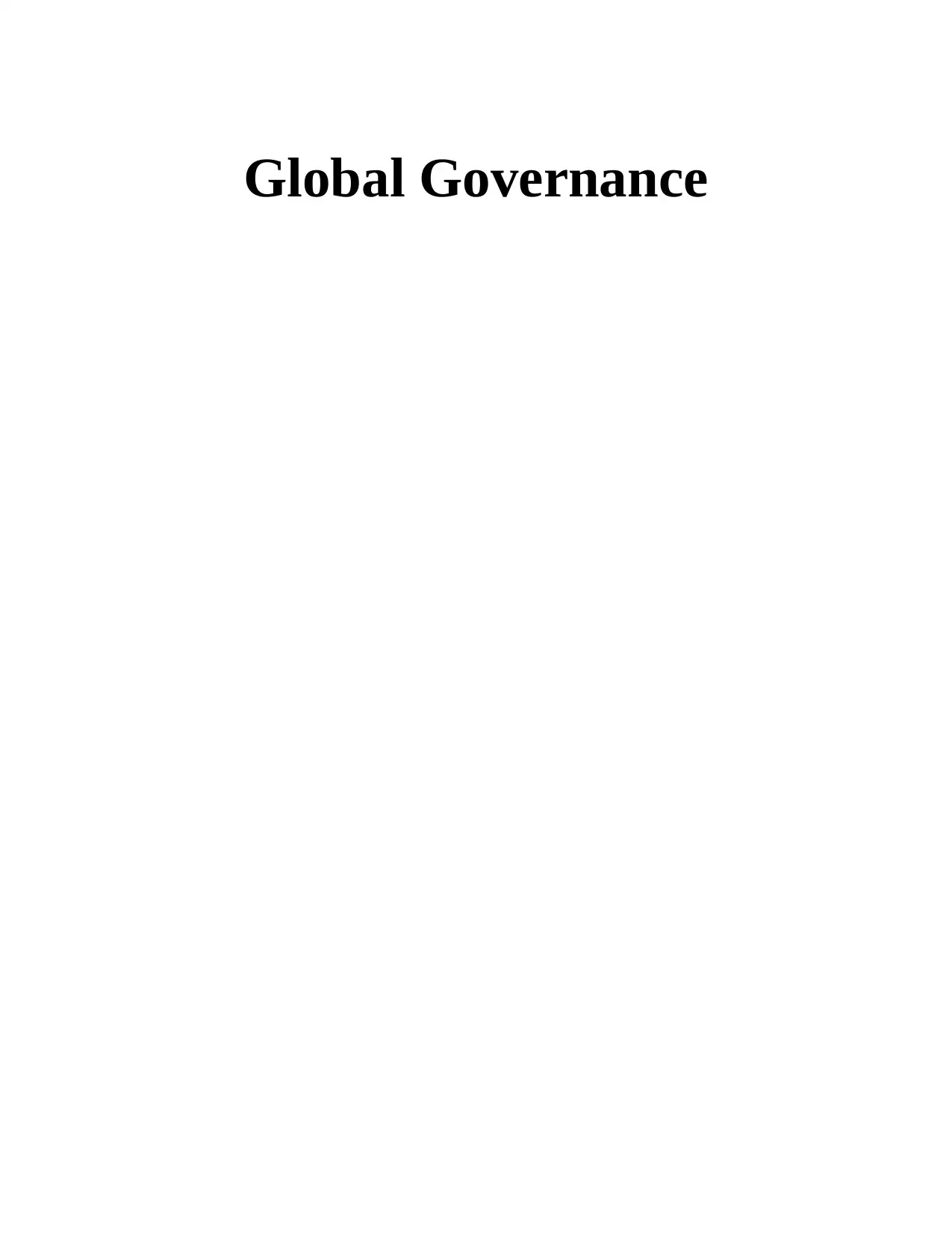
Global Governance
Paraphrase This Document
Need a fresh take? Get an instant paraphrase of this document with our AI Paraphraser
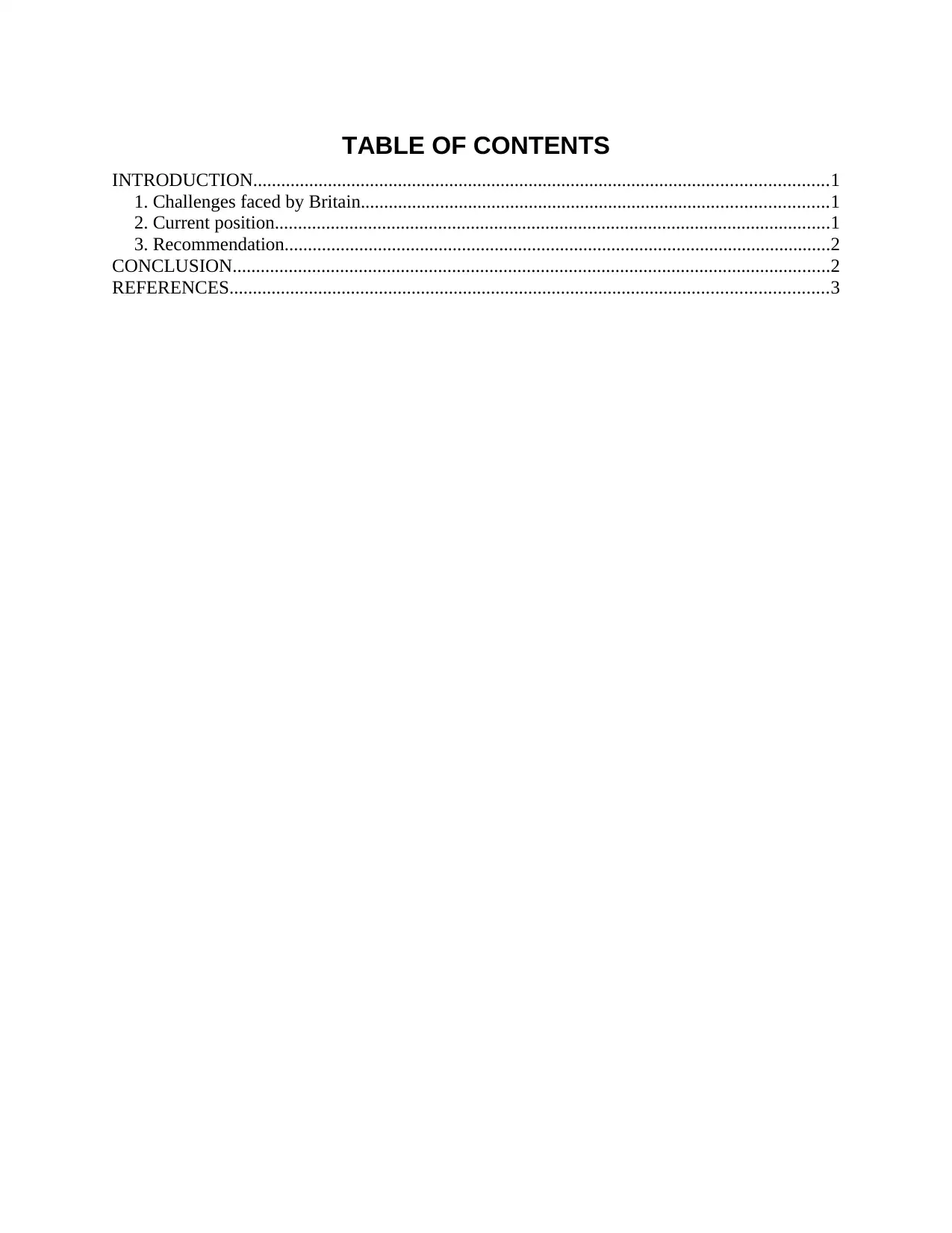
TABLE OF CONTENTS
INTRODUCTION...........................................................................................................................1
1. Challenges faced by Britain....................................................................................................1
2. Current position.......................................................................................................................1
3. Recommendation.....................................................................................................................2
CONCLUSION................................................................................................................................2
REFERENCES................................................................................................................................3
INTRODUCTION...........................................................................................................................1
1. Challenges faced by Britain....................................................................................................1
2. Current position.......................................................................................................................1
3. Recommendation.....................................................................................................................2
CONCLUSION................................................................................................................................2
REFERENCES................................................................................................................................3
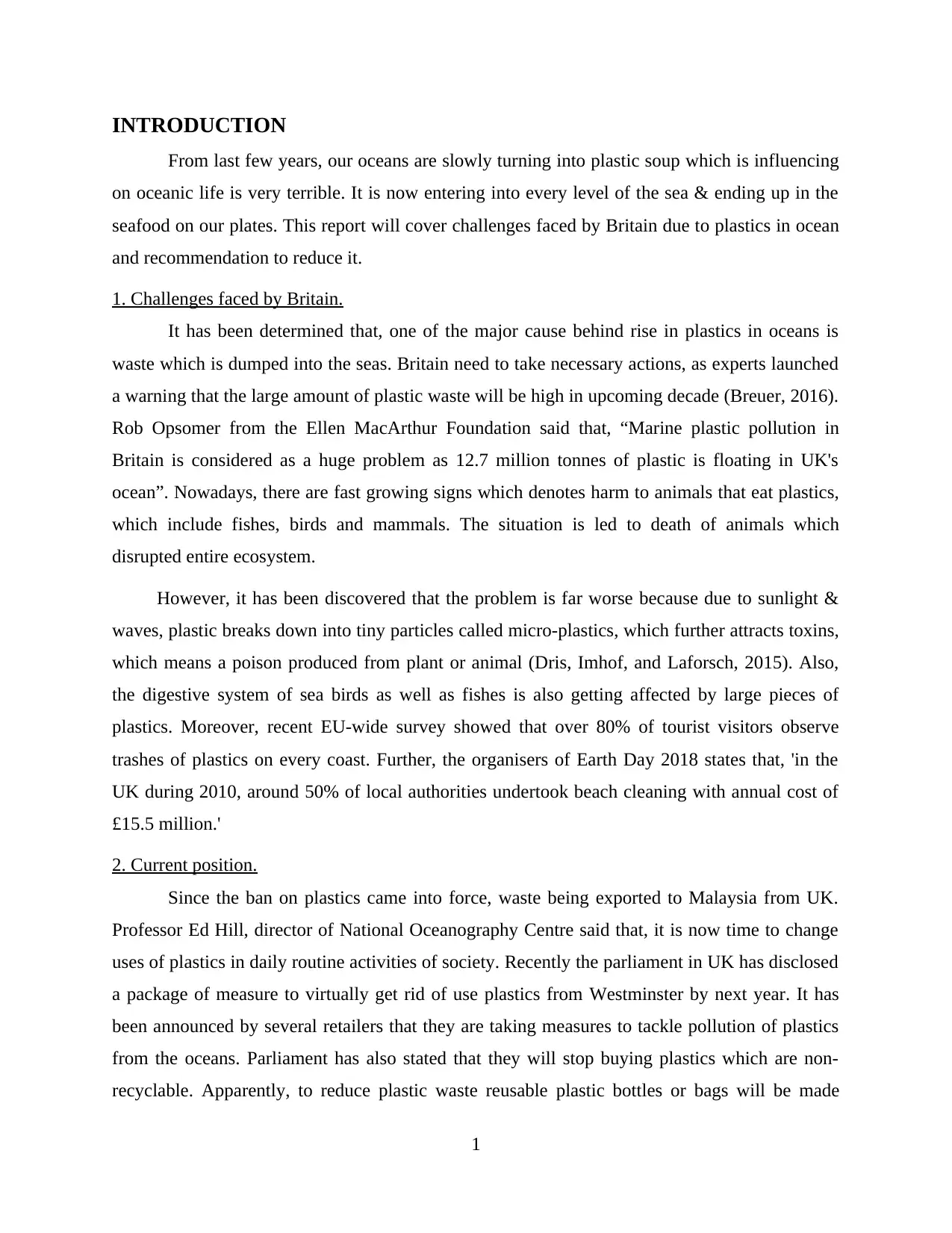
INTRODUCTION
From last few years, our oceans are slowly turning into plastic soup which is influencing
on oceanic life is very terrible. It is now entering into every level of the sea & ending up in the
seafood on our plates. This report will cover challenges faced by Britain due to plastics in ocean
and recommendation to reduce it.
1. Challenges faced by Britain.
It has been determined that, one of the major cause behind rise in plastics in oceans is
waste which is dumped into the seas. Britain need to take necessary actions, as experts launched
a warning that the large amount of plastic waste will be high in upcoming decade (Breuer, 2016).
Rob Opsomer from the Ellen MacArthur Foundation said that, “Marine plastic pollution in
Britain is considered as a huge problem as 12.7 million tonnes of plastic is floating in UK's
ocean”. Nowadays, there are fast growing signs which denotes harm to animals that eat plastics,
which include fishes, birds and mammals. The situation is led to death of animals which
disrupted entire ecosystem.
However, it has been discovered that the problem is far worse because due to sunlight &
waves, plastic breaks down into tiny particles called micro-plastics, which further attracts toxins,
which means a poison produced from plant or animal (Dris, Imhof, and Laforsch, 2015). Also,
the digestive system of sea birds as well as fishes is also getting affected by large pieces of
plastics. Moreover, recent EU-wide survey showed that over 80% of tourist visitors observe
trashes of plastics on every coast. Further, the organisers of Earth Day 2018 states that, 'in the
UK during 2010, around 50% of local authorities undertook beach cleaning with annual cost of
£15.5 million.'
2. Current position.
Since the ban on plastics came into force, waste being exported to Malaysia from UK.
Professor Ed Hill, director of National Oceanography Centre said that, it is now time to change
uses of plastics in daily routine activities of society. Recently the parliament in UK has disclosed
a package of measure to virtually get rid of use plastics from Westminster by next year. It has
been announced by several retailers that they are taking measures to tackle pollution of plastics
from the oceans. Parliament has also stated that they will stop buying plastics which are non-
recyclable. Apparently, to reduce plastic waste reusable plastic bottles or bags will be made
1
From last few years, our oceans are slowly turning into plastic soup which is influencing
on oceanic life is very terrible. It is now entering into every level of the sea & ending up in the
seafood on our plates. This report will cover challenges faced by Britain due to plastics in ocean
and recommendation to reduce it.
1. Challenges faced by Britain.
It has been determined that, one of the major cause behind rise in plastics in oceans is
waste which is dumped into the seas. Britain need to take necessary actions, as experts launched
a warning that the large amount of plastic waste will be high in upcoming decade (Breuer, 2016).
Rob Opsomer from the Ellen MacArthur Foundation said that, “Marine plastic pollution in
Britain is considered as a huge problem as 12.7 million tonnes of plastic is floating in UK's
ocean”. Nowadays, there are fast growing signs which denotes harm to animals that eat plastics,
which include fishes, birds and mammals. The situation is led to death of animals which
disrupted entire ecosystem.
However, it has been discovered that the problem is far worse because due to sunlight &
waves, plastic breaks down into tiny particles called micro-plastics, which further attracts toxins,
which means a poison produced from plant or animal (Dris, Imhof, and Laforsch, 2015). Also,
the digestive system of sea birds as well as fishes is also getting affected by large pieces of
plastics. Moreover, recent EU-wide survey showed that over 80% of tourist visitors observe
trashes of plastics on every coast. Further, the organisers of Earth Day 2018 states that, 'in the
UK during 2010, around 50% of local authorities undertook beach cleaning with annual cost of
£15.5 million.'
2. Current position.
Since the ban on plastics came into force, waste being exported to Malaysia from UK.
Professor Ed Hill, director of National Oceanography Centre said that, it is now time to change
uses of plastics in daily routine activities of society. Recently the parliament in UK has disclosed
a package of measure to virtually get rid of use plastics from Westminster by next year. It has
been announced by several retailers that they are taking measures to tackle pollution of plastics
from the oceans. Parliament has also stated that they will stop buying plastics which are non-
recyclable. Apparently, to reduce plastic waste reusable plastic bottles or bags will be made
1
⊘ This is a preview!⊘
Do you want full access?
Subscribe today to unlock all pages.

Trusted by 1+ million students worldwide
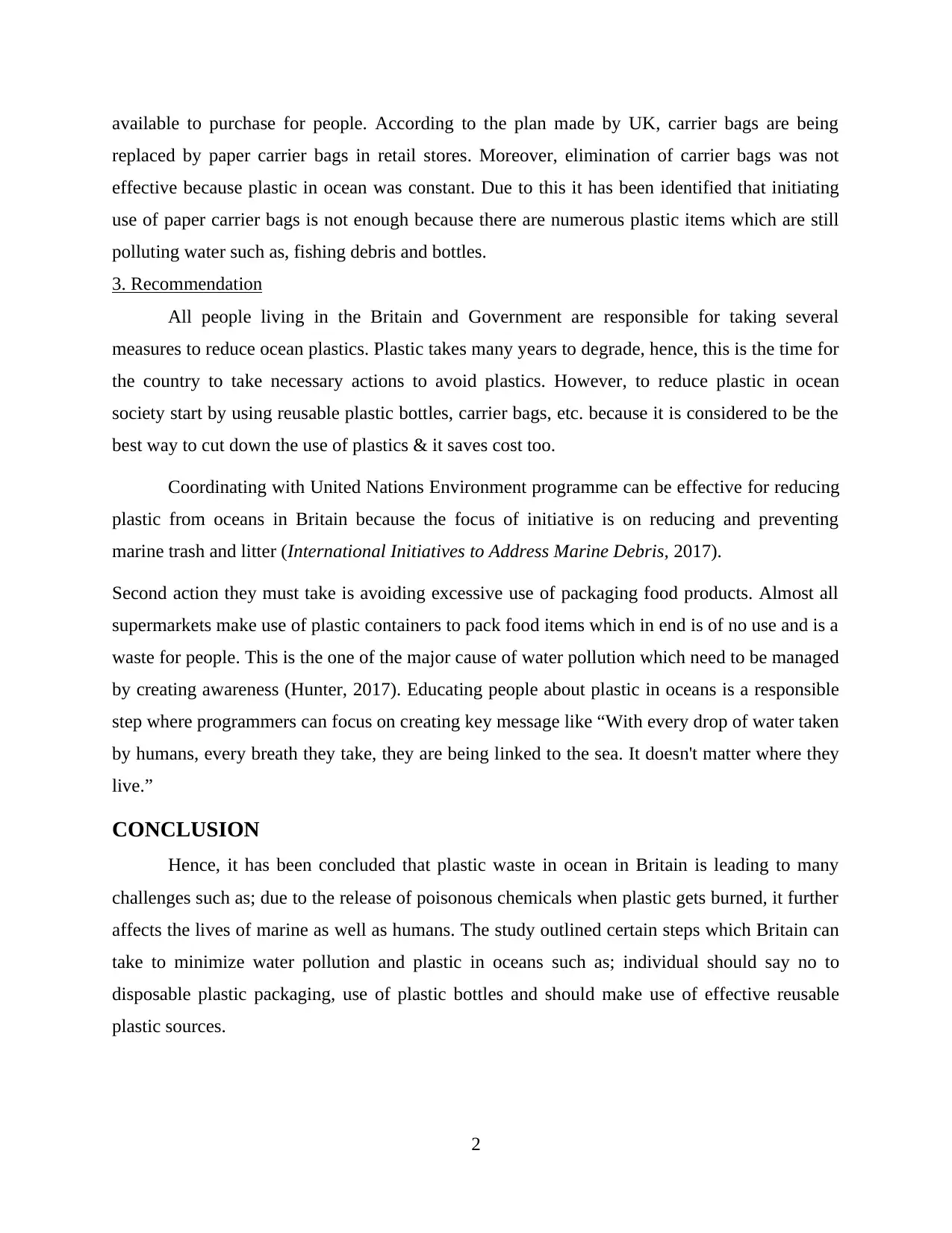
available to purchase for people. According to the plan made by UK, carrier bags are being
replaced by paper carrier bags in retail stores. Moreover, elimination of carrier bags was not
effective because plastic in ocean was constant. Due to this it has been identified that initiating
use of paper carrier bags is not enough because there are numerous plastic items which are still
polluting water such as, fishing debris and bottles.
3. Recommendation
All people living in the Britain and Government are responsible for taking several
measures to reduce ocean plastics. Plastic takes many years to degrade, hence, this is the time for
the country to take necessary actions to avoid plastics. However, to reduce plastic in ocean
society start by using reusable plastic bottles, carrier bags, etc. because it is considered to be the
best way to cut down the use of plastics & it saves cost too.
Coordinating with United Nations Environment programme can be effective for reducing
plastic from oceans in Britain because the focus of initiative is on reducing and preventing
marine trash and litter (International Initiatives to Address Marine Debris, 2017).
Second action they must take is avoiding excessive use of packaging food products. Almost all
supermarkets make use of plastic containers to pack food items which in end is of no use and is a
waste for people. This is the one of the major cause of water pollution which need to be managed
by creating awareness (Hunter, 2017). Educating people about plastic in oceans is a responsible
step where programmers can focus on creating key message like “With every drop of water taken
by humans, every breath they take, they are being linked to the sea. It doesn't matter where they
live.”
CONCLUSION
Hence, it has been concluded that plastic waste in ocean in Britain is leading to many
challenges such as; due to the release of poisonous chemicals when plastic gets burned, it further
affects the lives of marine as well as humans. The study outlined certain steps which Britain can
take to minimize water pollution and plastic in oceans such as; individual should say no to
disposable plastic packaging, use of plastic bottles and should make use of effective reusable
plastic sources.
2
replaced by paper carrier bags in retail stores. Moreover, elimination of carrier bags was not
effective because plastic in ocean was constant. Due to this it has been identified that initiating
use of paper carrier bags is not enough because there are numerous plastic items which are still
polluting water such as, fishing debris and bottles.
3. Recommendation
All people living in the Britain and Government are responsible for taking several
measures to reduce ocean plastics. Plastic takes many years to degrade, hence, this is the time for
the country to take necessary actions to avoid plastics. However, to reduce plastic in ocean
society start by using reusable plastic bottles, carrier bags, etc. because it is considered to be the
best way to cut down the use of plastics & it saves cost too.
Coordinating with United Nations Environment programme can be effective for reducing
plastic from oceans in Britain because the focus of initiative is on reducing and preventing
marine trash and litter (International Initiatives to Address Marine Debris, 2017).
Second action they must take is avoiding excessive use of packaging food products. Almost all
supermarkets make use of plastic containers to pack food items which in end is of no use and is a
waste for people. This is the one of the major cause of water pollution which need to be managed
by creating awareness (Hunter, 2017). Educating people about plastic in oceans is a responsible
step where programmers can focus on creating key message like “With every drop of water taken
by humans, every breath they take, they are being linked to the sea. It doesn't matter where they
live.”
CONCLUSION
Hence, it has been concluded that plastic waste in ocean in Britain is leading to many
challenges such as; due to the release of poisonous chemicals when plastic gets burned, it further
affects the lives of marine as well as humans. The study outlined certain steps which Britain can
take to minimize water pollution and plastic in oceans such as; individual should say no to
disposable plastic packaging, use of plastic bottles and should make use of effective reusable
plastic sources.
2
Paraphrase This Document
Need a fresh take? Get an instant paraphrase of this document with our AI Paraphraser
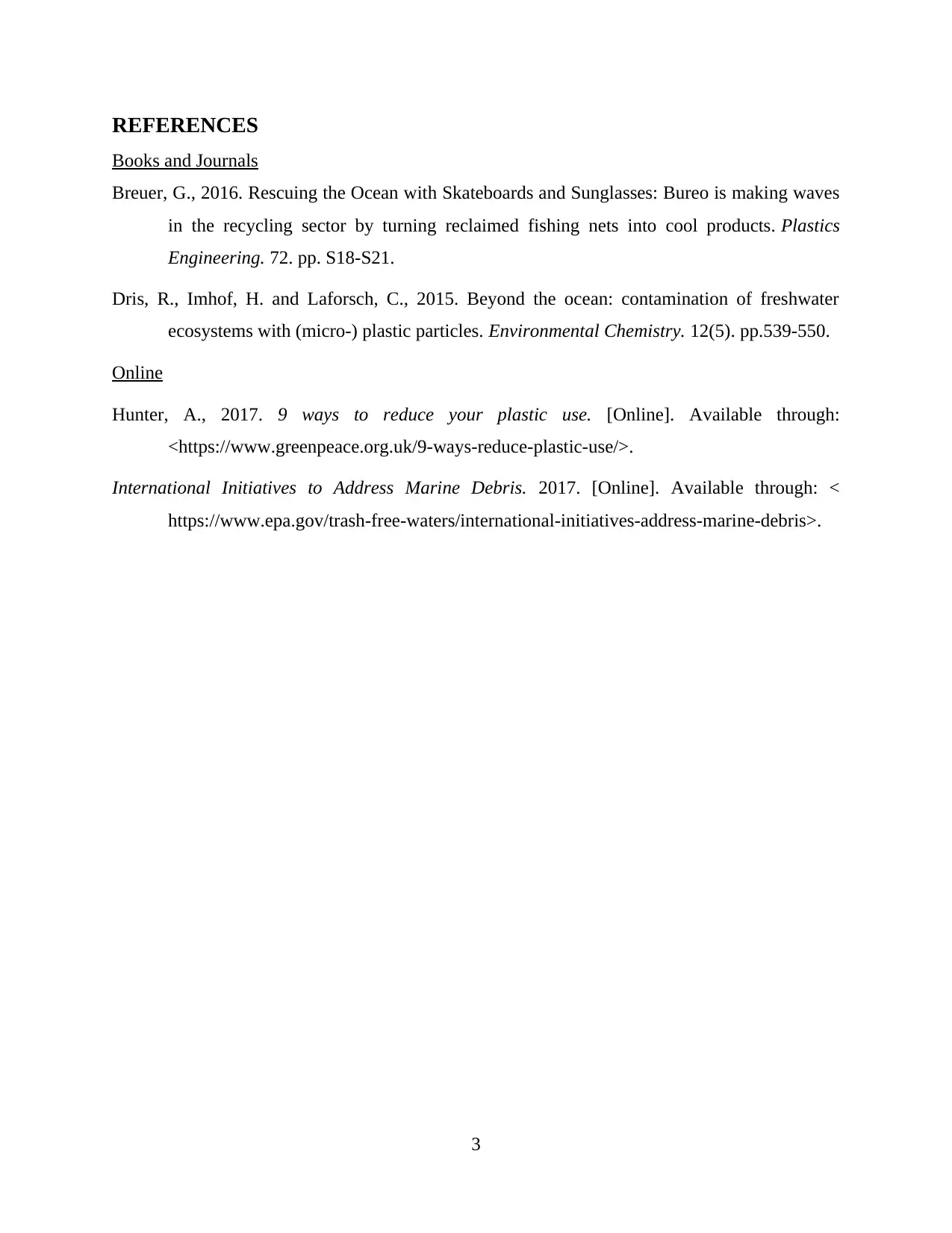
REFERENCES
Books and Journals
Breuer, G., 2016. Rescuing the Ocean with Skateboards and Sunglasses: Bureo is making waves
in the recycling sector by turning reclaimed fishing nets into cool products. Plastics
Engineering. 72. pp. S18-S21.
Dris, R., Imhof, H. and Laforsch, C., 2015. Beyond the ocean: contamination of freshwater
ecosystems with (micro-) plastic particles. Environmental Chemistry. 12(5). pp.539-550.
Online
Hunter, A., 2017. 9 ways to reduce your plastic use. [Online]. Available through:
<https://www.greenpeace.org.uk/9-ways-reduce-plastic-use/>.
International Initiatives to Address Marine Debris. 2017. [Online]. Available through: <
https://www.epa.gov/trash-free-waters/international-initiatives-address-marine-debris>.
3
Books and Journals
Breuer, G., 2016. Rescuing the Ocean with Skateboards and Sunglasses: Bureo is making waves
in the recycling sector by turning reclaimed fishing nets into cool products. Plastics
Engineering. 72. pp. S18-S21.
Dris, R., Imhof, H. and Laforsch, C., 2015. Beyond the ocean: contamination of freshwater
ecosystems with (micro-) plastic particles. Environmental Chemistry. 12(5). pp.539-550.
Online
Hunter, A., 2017. 9 ways to reduce your plastic use. [Online]. Available through:
<https://www.greenpeace.org.uk/9-ways-reduce-plastic-use/>.
International Initiatives to Address Marine Debris. 2017. [Online]. Available through: <
https://www.epa.gov/trash-free-waters/international-initiatives-address-marine-debris>.
3

4
⊘ This is a preview!⊘
Do you want full access?
Subscribe today to unlock all pages.

Trusted by 1+ million students worldwide
1 out of 6
Related Documents
Your All-in-One AI-Powered Toolkit for Academic Success.
+13062052269
info@desklib.com
Available 24*7 on WhatsApp / Email
![[object Object]](/_next/static/media/star-bottom.7253800d.svg)
Unlock your academic potential
Copyright © 2020–2026 A2Z Services. All Rights Reserved. Developed and managed by ZUCOL.





